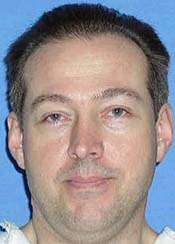David Harris was executed by the State of Texas for the murder of Mark Mays
According to court documents David Harris would go to Mark Mays apartment and forced him into a washroom and then forced Mays girlfriend out of the apartment. Mark Mays would get out and soon a gun battle took place where Mays was shot and killed
David Harris would be arrested, convicted and sentenced to death
David Harris would be executed by lethal injection on June 30 2004
David Harris Photos

David Harris FAQ
When Was David Harris Executed
David Harris was executed on June 30 2004
David Harris Case
After exhausting all appeal options Wednesday, a Texas inmate whose false testimony sent an innocent man to death row for a 1976 murder was executed for an unrelated slaying. “Sir, in honor of a true American hero, let’s roll,” David Ray Harris told the warden as he lay strapped to the gurney in the death chamber. “Lord Jesus, receive my spirit.”
Harris, 43, was pronounced dead at 6:48 p.m., 11 minutes after the combination of drugs began flowing. His final statement was a reference to the words of Todd Beamer, one of the passengers who rose up against the hijackers on United Airlines Flight 93 on Sept. 11, 2001, leading to its crash in a Pennsylvania field. Harris, a bricklayer from Vidor, was put to death one day after receiving a delay from a Houston judge because of his appeal claiming that one of the chemicals used in lethal injections causes intense pain. The Texas attorney general’s office appealed to the 5th U.S. Circuit Court of Appeals, which vacated the reprieve Wednesday afternoon.
Harris was convicted of murdering Mark Mays of Beaumont in 1985 after breaking into Mays’ apartment and trying to abduct his girlfriend. He was the 10th Texas inmate executed this year. Mays’ former girlfriend, Roxanne Burkhart, who credits him with enabling her to escape, witnessed the execution with Mays’ sister, Melissa Mays Davis. Both said they thought the execution was peaceful and humane. “I can’t think of an easier way to go. I don’t think getting five bullets in the head is a very humane way to go,” said Burkhart. “Tomorrow, there won’t be any more victims for David Ray Harris.”
U.S. District Judge Vanessa Gilmore granted Harris a delay on Tuesday after his attorneys argued that one of the three chemicals used in the lethal injection — pancuronium bromide — amounts to cruel and unusual punishment because it paralyzes inmates, preventing them from showing agony caused by potassium chloride.
Harris may have been better known for his testimony that put an innocent man, Randall Dale Adams, on death row for the 1976 slaying of a Dallas police officer. Adams spent 12 years in prison for the shooting death of officer Robert Wood and, in May 1979, came within three days of execution for a crime he insisted he didn’t commit. The following year, the U.S. Supreme Court threw out his death sentence because of jury selection problems. The case was detailed in The Thin Blue Line, a 1988 documentary film that portrayed Adams as wrongly convicted. His sentence was commuted to life and he was released in 1989. Harris implicated Adams when questioned by authorities. Years later, while on death row for Mays’ murder, he recanted his testimony and attested to Adams’ innocence. Harris never was charged in Wood’s slaying.
According to court records, Harris, then 24, broke into Mays’ Beaumont apartment before dawn Sept. 1, 1985. He led Burkhart outside toward his truck, but Mays grabbed a gun and they exchanged shots. Mays was fatally wounded but Burkhart escaped. Harris was arrested four days later. Dianne Clements, president of the local victims’ advocacy group Justice for All, said Harris’ appeal contending that lethal injection is cruel and unusual was part of a recent trend. “This is the appeal du jour,” she said.
The Death Penalty Information Center reports on its Web site that 36 of the 37 states with the death penalty use lethal injection. Texas became the first state to execute someone by injection in 1982. The U.S. Supreme Court in May ruled in a rare 9-0 vote for a death penalty case that an Alabama killer could challenge his scheduled execution by injection. The court ruled that David Nelson could argue in lower courts that cutting his arm or leg to reach veins would be cruel and unusual punishment.
The Chronicle reported in May that at least five Texas inmates, including Harris, had challenged their sentences on grounds that lethal injection causes suffering before death. They lost appeals in lower courts before the U.S. Supreme Court made its decision in the Alabama case. USA Today reported in March that 15 death row prisoners have challenged the legality of the lethal-injection process in the past year. While many received temporary stays of execution, like Harris, all except for Nelson and a Virginia killer lost their appeals and were executed, the newspaper reported.
http://www.chron.com/cs/CDA/ssistory.mpl/metropolitan/2656593









